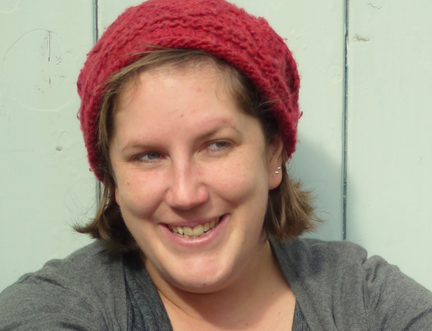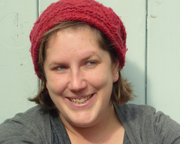I Wanna Hold Your Hand
By Cat Clarke

In 2018, we commissioned 51 authors from 25 countries to write essays exploring ideas about freedom for The Freedom Papers, a publication produced in partnership with Gutter Magazine. Five of these essays, including the one featured below, were commissioned by young programmers aged 8-14 who were working with us as part of the Year of Young People 2018. Read on for Cat Clarke's essay, and visit guttermag.co.uk to purchase a copy of The Freedom Papers.
There are some things in life you take for granted. And by you, I mean me, so I might as well continue in that vein. I take it for granted that I can turn on the kitchen tap and fill up my glass with cold, clean water. I take it for granted that I can use bits of metal and paper to exchange for things. (Books, mostly.) I take it for granted that I have a roof over my head and food on the table. I have freedom of speech, freedom of movement. I have the freedom to do whatever I want with my body (which led to an inadvisable tattoo).
I am lucky. Very, very, very lucky.
I’m free to wear pyjamas all day long and have ice cream for lunch and listen to frankly terrible songs and sing along at the top of my voice. (My next-door neighbour may hate me but I’m OK with that.) I’m free to write the stories I want to write, which is something I’m grateful for every single day. I’m free to hold the hand of the person I love when I walk down the street.
But wait. Let’s look at that last one. Now that’s something you can take for granted if you live in certain countries. If you’re a certain religion. If the person you love is deemed by society to be the sort of person you’re supposed to love.
I am a privileged white middle-class woman, living in a (mostly) liberal country. I am also queer. In the UK it’s now legal for two women to get married. For two men to get married. But this has only been the case for three years. That’s no time at all. Anyway, rights equals freedom, yes? Well, sort of.
I am married to someone special. She’s pretty great. She makes me laugh and she laughs at me when I deserve to be laughed at. Which is 90% of the time. She doesn’t frown on my buying ALL the books when our house is already stuffed to the rafters with them.
Because I’m a soppy romantic fool, I like to hold hands with my wife when we’re walking along the street. Unless it’s freezing cold outside (which is often the case, because, you know, Scotland) and then I prefer to keep my gloved hands all snug and toasty in my pockets, or – even better – not leave the house in the first place. So, holding hands with the person I love is one of those freedoms I’m lucky enough to have. In some countries, my relationship would be punishable by death or a prison sentence.
In 2018, same-sex relationships are illegal in 72 countries, and punishable by death in eight. I was born in Zambia, a country in which same-sex relationships are punishable by up to 14 years in prison. In a recent, disturbing case, the Zambian police asked for the public’s help in hunting down two women who’d been photographed together in a bar.
Around the world, the situation is often worse for gay men than it is for gay women. But that’s because in some countries a relationship between women isn’t even recognized as even possible. Lesbian relationships have traditionally been erased in many different cultures (hello, patriarchy!), but with that erasure comes a kind of protection. If your relationship isn’t considered possible, at least you won’t be imprisoned or executed for it.
Here in Scotland I can pretty much hold my wife’s hand whenever we’re walking down the street. Except… except when I can’t. Now ‘can’t’ is a funny word. I can physically do it, and no one’s going to arrest me. But does that mean it’s safe? Does that mean it’s advisable? Worth the risk? We’ve been on the receiving end of disapproving looks and whispered comments. So what? Maybe that’s not such a big deal. Most of us have experienced that at some point or another – maybe for a dodgy fashion choice or for laughing too loud or for taking up too much room on the pavement with your mates. But these looks and comments are different somehow. They’re aimed at us merely for being. For existing and for daring not to hide who we are.
Late at night is when it’s tricky. A group of people approaching on a dark street. I make quick calculations: how many of them are there? What age are they? And then I ask myself if they look drunk. Is it a stag party, maybe? Or a big gang of girls? Which is riskier? There’s no right answer. And my calculations aren’t really calculations at all: they’re assumptions and guesses. I come to my conclusion based on previous experiences, and I make my decision: do we keep holding hands or let go? Late at night, the answer is usually the same. We both let go. Just in case. Better safe than sorry.
I feel ashamed. I feel that maybe I’m judging people too harshly. After all, don’t people deserve the benefit of the doubt? There’s no right answer here either. Giving the wrong person the benefit of the doubt could end up going very, very wrong. So most of the time, I don’t. I assume the worst. And then I find myself feeling like a coward. What if every gay couple in the world decided not to let go? To show that we’re here and we’re not afraid. Wouldn’t that make things better for all of us?
I know the answer to this one. But until things change drastically, it’s never going to happen.
It’s a small thing in the scheme of things, but it’s representative of something bigger, something much more important. For freedom to mean something it has to feel like freedom, and not just be freedom only on paper. And this should be the case for everyone. For all of us. For queer people, trans people, and non-binary people. For people of colour, and people with disabilities, and people living their lives at the intersections of these identities.
We all deserve the freedom to be who we are without fear.
Copyright © 2018, Cat Clarke. All rights reserved.
Supported by the Scottish Government’s Edinburgh Festivals Expo Fund through Creative Scotland.


 Major new partnership with Celtic Connections
Major new partnership with Celtic Connections 

